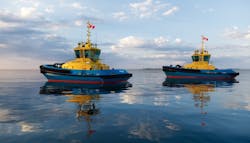Tugboat firm trying Electric Vessels at Neptune Terminal in Vancouver
Mining firm Teck Resources has signed an agreement with tugboat-operator SAAM Towage to use two ElectRA 2300 SX tugs at the Neptune Terminal in Vancouver, British Columbia, starting from the second half of 2023.
The two ElectRA 2300 SX tugs are expected to eliminate more than 2,400 tonnes of GHG emissions annually and reduce underwater noise.
“Working with SAAM Towage to further reduce the greenhouse gas emissions associated with transportation of our products is another step forward in achieving our climate goals and contributing to global climate action,” said Jonathan Price, CEO, Teck. “Collaborating with transportation providers to develop green transportation corridors is part of our climate action strategy and supports our goal of net zero emissions by 2050.”
Robert Allan has designed the electric tugboats, which will be built at the Sanmar Shipyards in Turkey.
Teck intends to reduce emissions across its supply chain and reduce shipping emissions intensity by 40% by 2030.
Earlier efforts made by Teck include an agreement with Oldendorff Carriers to use energy efficient bulk carriers for steelmaking coal shipments from the Port of Vancouver and a pilot of a fully electric on-highway transport truck to transport copper concentrate between the Highland Valley Copper Operations and a rail-loading facility in Ashcroft, B.C.
About the Author
EnergyTech Staff
Rod Walton is head of content for EnergyTech.com. He has spent 17 years covering the energy industry as a newspaper and trade journalist.
Walton formerly was energy writer and business editor at the Tulsa World. Later, he spent six years covering the electricity power sector for Pennwell and Clarion Events. He joined Endeavor and EnergyTech in November 2021.
He can be reached at [email protected].
EnergyTech is focused on the mission critical and large-scale energy users and their sustainability and resiliency goals. These include the commercial and industrial sectors, as well as the military, universities, data centers and microgrids.
Many large-scale energy users such as Fortune 500 companies, and mission-critical users such as military bases, universities, healthcare facilities, public safety and data centers, shifting their energy priorities to reach net-zero carbon goals within the coming decades. These include plans for renewable energy power purchase agreements, but also on-site resiliency projects such as microgrids, combined heat and power, rooftop solar, energy storage, digitalization and building efficiency upgrades.
